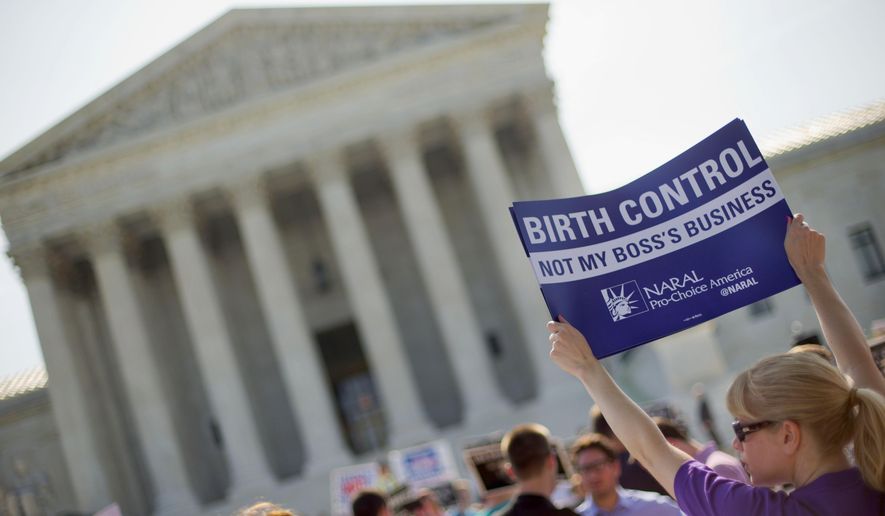The Obama administration said Thursday that faith-based nonprofits should comply with Obamacare’s birth control mandate because they enjoy much greater leeway than the corporations that sued and won before the Supreme Court last year.
Government attorneys made their pitch to the Circuit Court of Appeals for the District of Columbia Circuit after a pro-life ministry, Priests for Life, asked the court to reconsider a three-judge ruling that requires religious nonprofits to object, in writing, to regulations that require employer health care plans to insure contraceptives.
The group says the November decision contradicted the Supreme Court’s ruling in the Hobby Lobby case, which said closely held corporations did not have to insure contraceptives that conflicted with their owners’ beliefs, particularly morning-after pills that some equate with abortion.
The justices cited the Religious Freedom Restoration Act of 1993, which passed with bipartisan support and requires the government to achieve its aims in the least restrictive way possible.
But the administration said nonprofits should not expect the Hobby Lobby case to bail them out.
“Unlike plaintiffs here, the plaintiffs in Hobby Lobby were closely held for-profit companies that were not eligible for the accommodations,” the government’s attorneys said. “The linchpin of the court’s ’very specific’ holding in Hobby Lobby was the existence of the opt-out alternative afforded to organizations such as the plaintiffs in this case.”
The administration twice has tried to accommodate religious nonprofits that object to the mandate. For now, the nonprofits must object in writing to an insurer or third-party administrator, or to the Department of Health and Human Services, so that other people can manage and pay for the coverage while the nonprofits themselves do nothing.
Many religious nonprofits say the forms serve as triggers for services to which they object.
Priests for Life has asked the D.C. Circuit to hear their case en banc, with a full slate of judges.
In its response Thursday, the administration said the nonprofits may opt out, but their role stops there.
“On plaintiffs’ reasoning, a conscientious objector to the draft can not only can refrain from serving himself, but can also allege that his religion is substantially burdened if the government drafts a replacement to serve instead,” the government wrote.
Priests for Life does not have to comply with the prior ruling while their appeal is pending, and the group has said it would refuse to anyway.
“It makes no difference whether plaintiffs must pay for the contraceptive coverage,” the ministry’s attorneys said in court papers. “What matters is that, in their religious judgment, it would be immoral for them to contract with a vendor that will provide the offending coverage to their plan beneficiaries.”
• Tom Howell Jr. can be reached at thowell@washingtontimes.com.




Please read our comment policy before commenting.